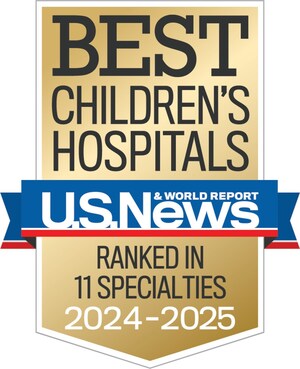Cincinnati Children's Hospital Medical Center And Toyota Kick-Off Nationwide Pledge To Encourage Americans To Buckle Up For Life
A Public Health Emergency of Epic Proportions with Only One in Four Child Car Seats in the U.S. Properly Installed
Seat Belts and Car Seats have the Power to Save Lives
Multi-million dollar Commitment from Toyota Funds New Research Findings, Program Expansion to New Cities and Nationwide Pledge on BuckleUpforLife.org
NEW YORK, Sept. 17, 2013 /PRNewswire/ -- Cincinnati Children's Hospital Medical Center, a national leader in pediatric medicine, and Toyota announced today the first annual National Buckle Up for Life Day - a nationwide movement dedicated to improving child passenger safety. In recognition of Child Passenger Safety Week (September 15-21, 2013), the partnership will launch "National Buckle Up for Life Day" revealing new research findings on child car seat safety, increased funding from Toyota for three new Buckle Up for Life partner cities, and a nationwide pledge encouraging the nation to Buckle Up for Life.
Building on a partnership that began in 2004 between one of the world's leading children's hospitals - Cincinnati Children's and the global automotive manufacturer - Toyota, the Buckle Up for Life program is designed to help save lives by educating communities about the number one cause of death of children under the age of 12 in the United States--motor vehicle crashes.
Car crashes are the number one killer of children in the United States between the ages 1 and 12.i Only 1 out of every 4 child car seats are properly installed.ii Furthermore, due to multiple factors, Hispanic and African American children are 10 times less likely to be properly restrained in a vehicleiii.
Buckle Up for Life has recently conducted a survey which reveals parental overconfidence in their knowledge about child car seats may be a contributing factor to some deaths of children who are involved in fatal car crashes.
Key Survey Findings and Tips
- Confidence levels are high: When selecting the appropriate car seats, 96 percent of parents are "very/somewhat confident." However, 41 percent of parents are unaware that car seats have an expiration date.
- Tip: Always remember to read the user's guide to find out the seat's expiration date and other important information. Every car seat is different.
- Car seat inspection station usage is low: Nearly half of parents (42 percent) have had their child car seat installation checked by an expert. Yet many also mentioned practicing unsafe behaviors, such as dressing their child in bulky outerwear or not removing their child's jacket before buckling him/her into the child car seat (41 percent); and more than a quarter of parents surveyed (26 percent) have allowed their child to ride in the front seat of the vehicle before the age of 12.
- Tip: Always buckle your child in the car seat first before placing coats or blankets over the harness. Keep in mind that bulky clothing can alter a snug fit.
- Tip: Look for a local child car seat inspection station via the National Highway Traffic Safety Administration.
- African Americans are less informed about some critical child passenger safety issues: African American parents surveyed are more likely than average to acquire a second-hand car seat (22 percent) without knowledge of the car seat's history. Among those who say they have acquired a second-hand car seat, 61 percent are unaware whether or not there was a product recall and 27 percent did not know the age of the car seat.
- Tip: Always remember to get as much information as possible about a second-hand car seat, including the user's guide. Be aware of technology and standard improvements as well as car seat recalls.
- Hispanics feel overwhelmed by the choices: Only one-third of Hispanic parents are confident when researching, choosing, acquiring and installing a child car seat. However, for some Hispanic parents the research phase can leave them feeling overwhelmed (18 percent) while the installation phase can leave them feeling frustrated (8 percent).
- Tip: Always remember that there is information available for every stage of the child car seat journey. Visit BuckleUpforLife.org for more details about child car seat safety.
"The research findings are particularly alarming because even though parents indicate they are completely confident throughout the child car seat journey, the number of children dying unnecessarily in motor vehicle-related crashes is still high," said Dr. Victor Garcia, founding director of Trauma Services at Cincinnati Children's, professor of pediatric surgery and visionary of Buckle Up for Life. "This is a public health emergency of epic proportions. The seat belt, or car seat should be held in the same health category as a vaccine as it has the power to save lives," said Garcia.
Multi-year, Multi-million Dollars Funds Buckle Up for Life Expansion
As part of Toyota's ongoing commitment to provide safety programs to passengers and drivers of all ages, the company has increased its funding of Buckle Up for Life by six million dollars over the next three years, allowing the program to expand from the current eight cities to a total of 17 cities by 2016. This investment is added to the more than two and a half million dollars of support Toyota has provided over the past nine years. To-date Buckle Up for Life has had tremendous results, including providing more than 40,000 child car seats to families in need. In one city alone, the use of proper child car seats by program participants nearly tripled.
The three new Buckle Up for Life partner hospitals for 2013 are Cohen Children's Medical Center (Long Island, NY), Le Bonheur Children's Hospital (Memphis, TN) and Phoenix Children's Hospital (Phoenix, AZ). They join successful programs already in place with local hospital partners in Chicago, Cincinnati, Houston, Las Vegas, Los Angeles, Philadelphia, Orange Country, CA, and San Antonio.
"At Toyota, we are strongly committed to the belief that driver and passenger safety is a universal need and something everyone should have access to," said Latondra Newton, group vice president of Toyota Motor North America Inc. "That is why we partnered with Cincinnati Children's to create Buckle Up for Life. We consider today to be both a celebration of all we have achieved and a call to action for the tremendous amount of work still to be done."
Buckle Up for Life Pledge
The Buckle Up for Life pledge is a national call to action inviting the public to take a pledge to Buckle Up for Life and share the safety with loved ones. Visit the Buckle Up for Life website, www.BuckleUpforLife.org or join the more than 170 million members of the Causes community at www.causes.com/Toyota to take the pledge.
ABOUT BUCKLE UP FOR LIFE SURVEY
The findings reported in this release are from an online survey conducted by Edelman Berland. The sample consisted of 1,010 parents, with children 12 years of age or younger, who currently own or lease a vehicle. The interviews were conducted from August 8th – August 14th, 2013. All surveys were taken online and the respondents are nationally representative of race and region. The margin of error is +/- 3.04 percentage points at the 95% confidence level. Each questionnaire took an average of 12 minutes to complete and was offered in both English and Spanish.
ABOUT BUCKLE UP FOR LIFE
Buckle Up for Life is a national, community-based injury prevention program, created in 2004 in a partnership between trauma specialists at Cincinnati Children's and Toyota. The program's main goal is to help save lives by educating communities about the number one cause of death of children under the age of 12 in the U.S.
Buckle Up for Life works with local hospitals, churches and other trusted community partners in cities across the United States to address the economic, cultural and language barriers around motor vehicle safety. Over a six-week period, the program's medical experts and trained specialists work closely with participants of all ages and backgrounds to deliver vital safety information in an engaging, culturally-sensitive and memorable way. To date, the program has donated more than 40,000 child car seats to families in need and has made a significant impact, including tripling the proper use of child car seats among program participants in one city.
Through an expanded multi-year, multi-million dollar commitment from Toyota in 2013, Buckle Up for Life will continue to expand to new cities each year while leading a national movement to help elevate the conversation about this critical issue. To take the Buckle Up for Life pledge, learn more about the program and find child passenger safety resources, please visit www.buckleupforlife.org.
ABOUT CINCINNATI CHILDREN'S HOSPITAL MEDICAL CENTER
Cincinnati Children's Hospital Medical Center ranks third in the nation among all Honor Roll hospitals in U.S. News and World Report's 2013 Best Children's Hospitals ranking. It is ranked #1 for cancer and in the top 10 for nine of 10 pediatric specialties.
Cincinnati Children's, a non-profit organization, is one of the top two recipients of pediatric research grants from the National Institutes of Health, and a research and teaching affiliate of the University of Cincinnati College of Medicine.
The medical center is internationally recognized for improving child health and transforming delivery of care through fully integrated, globally recognized research, education and innovation.
Additional information can be found at www.cincinnatichildrens.org. Connect on the Cincinnati Children's blog, via Facebook and on Twitter.
ABOUT TOYOTA
Toyota (NYSE: TM) established operations in the United States in 1957 and currently operates 10 manufacturing plants. Toyota directly employs over 31,000 in the United States and its investment here is currently valued at more than $19.5 billion, including sales and manufacturing operations, research and development, financial services and design.
Toyota is committed to being a good corporate citizen in the communities where it does business and believes in supporting programs with long-term sustainable results. Toyota supports numerous organizations across the country, focusing on education, the environment and safety. To date, Toyota has contributed $700 million to nonprofits in the United States.
For more information on Toyota's commitment to improving communities nationwide, visit www.Toyota.com/community.
i http://www.safercar.gov/parents/CarSeats.htm#
ii http://www.nhtsa.gov/Safety/LATCH/
iii NHTSA Traffic Safety Facts (2008 Data) -- Research Note
SOURCE Cincinnati Children's Hospital Medical Center
WANT YOUR COMPANY'S NEWS FEATURED ON PRNEWSWIRE.COM?
Newsrooms &
Influencers
Digital Media
Outlets
Journalists
Opted In






Share this article